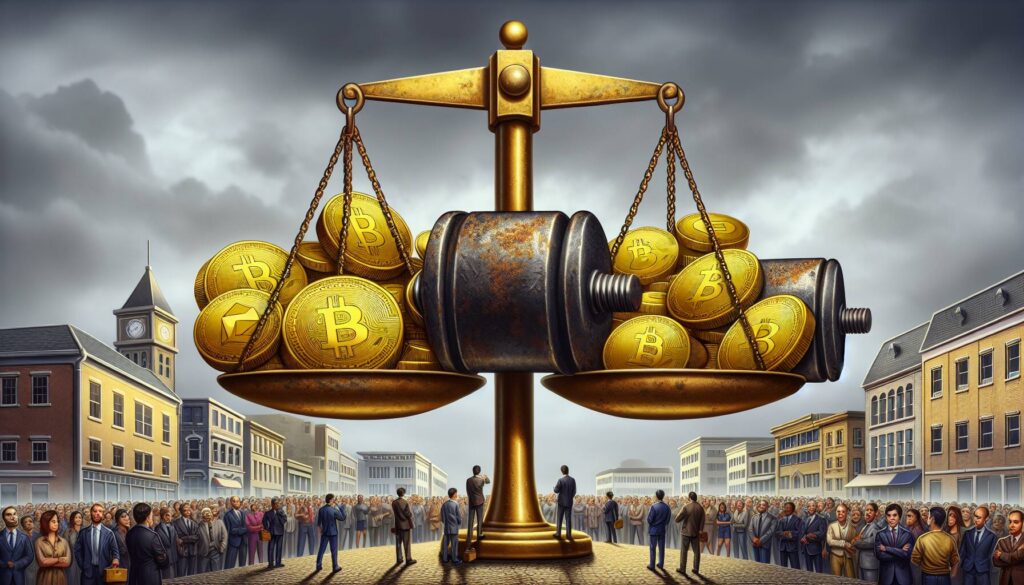The President of Belarus, Aleksandr Lukashenko, has recently sparked interest in the world of cryptocurrency by hinting at the potential for his nation to start mining digital currencies. In a conversation with Alexei Kushnarenko, the new minister of energy, Lukashenko pointed out Belarus’s surplus electricity as a compelling reason to explore this burgeoning industry. “Look at this mining. More and more people are turning to me. If it is profitable for us, let’s do it,” he remarked, according to reports from Belarusian media outlet Belta.
This development comes at a time when the U.S. is also contemplating its position in the cryptocurrency space, with discussions about establishing a national strategic crypto reserve. This reserve could encompass major cryptocurrencies like bitcoin (BTC), ether (ETH), and others. Lukashenko referenced this while commenting on global trends, stating, “You see the path the world is going. And especially the largest economy in the world… Therefore, there will be demand for them. Well, maybe we should do it ourselves,” underscoring his belief in the potential for crypto in Belarus.
Belarus wouldn’t be the pioneer in this endeavor; countries like Bhutan have already embraced cryptocurrency mining, using their abundant hydropower to facilitate operations. Bhutan boasts more than 100 megawatts of operational bitcoin mining infrastructure and plans to further expand its capacity by an impressive 500 megawatts. Meanwhile, El Salvador has also stepped into the crypto field, using geothermal energy for its own mining operations, albeit at a smaller scale.
“The world is moving toward cryptocurrency, and we need to consider our place in it,” Lukashenko emphasized, as Belarus aims to align itself with emerging global trends in the digital economy.

Belarus Explores Cryptocurrency Mining Opportunities
The President of Belarus, Aleksandr Lukashenko, has suggested that the country may begin mining cryptocurrencies due to its excess electricity. This move comes amid interest from the U.S. government in establishing a national crypto reserve. Here are the key points of this development:
- Potential for Cryptocurrency Mining:
- Lukashenko is considering cryptocurrency mining as a profitable venture for Belarus.
- The country has excess electricity resources that could be utilized for mining operations.
- U.S. Government’s Interest in Cryptocurrencies:
- The U.S. is studying the creation of a national strategic crypto reserve.
- Potential cryptocurrencies in the reserve include Bitcoin (BTC), Ether (ETH), and others.
- Global Shift Towards Crypto:
- Lukashenko acknowledged the growing global demand for cryptocurrencies.
- He indicated that the largest economies, like the U.S., are moving toward crypto involvement.
- Comparative Examples from Other Nations:
- The Kingdom of Bhutan is already leveraging its hydropower for Bitcoin mining.
- El Salvador utilizes geothermal energy for its Bitcoin operations, albeit on a smaller scale.
“Look at this mining. More and more people are turning to me. If it is profitable for us, let’s do it.” – Aleksandr Lukashenko
These developments may impact readers’ lives by influencing the future landscape of cryptocurrency, potentially leading to new investment opportunities, changes in the job market related to tech and energy sectors, and offering alternatives for countries striving for economic growth through innovative technologies.
Belarus Eyes Cryptocurrency Mining: A Game Changer or a Risky Venture?
In a bold move that has raised eyebrows across Eastern Europe, President Aleksandr Lukashenko of Belarus has opened the door to cryptocurrency mining, citing the country’s surplus electricity as a potential resource for this emerging digital frontier. This announcement coincides with increasing global interest in crypto reserves, particularly from major economies like the U.S., which is exploring the establishment of a national strategic crypto reserve encompassing prominent currencies like bitcoin and ether.
Competitive Advantages: Lukashenko’s pivot towards cryptocurrency mining presents several advantages. The most notable is Belarus’s access to excess electricity, positioning the nation as a potentially attractive location for energy-intensive cryptocurrency operations. Much like Bhutan, which has leveraged its hydropower capabilities to build a substantial mining infrastructure, Belarus stands to benefit from its energy resources. This could attract foreign investments and foster technological innovation within the country. Moreover, tapping into the global cryptocurrency boom may provide economic incentives to a nation that has faced significant international sanctions and challenges in recent years.
Disadvantages: However, this move is not without its pitfalls. The volatility inherent in cryptocurrency markets poses a significant risk. Should global markets shift or regulatory frameworks tighten—consider the tensions observed in U.S. policy-making—the investments Belarus makes could quickly turn sour. Additionally, the environmental impact of mining operations can spark controversies similar to those faced by nations like El Salvador, where the reliance on geothermal energy for mining has raised environmental sustainability questions. Lukashenko must also contend with growing skepticism regarding the legitimacy of cryptocurrencies within his regime, which may hinder investment and public support.
Beneficiaries and Challenges: The potential benefits reach beyond just Belarusian stakeholders. Foreign investors looking for stable energy sources might find Belarus an appealing option, fostering international partnerships that could elevate the country’s standing in the global marketplace. Conversely, this mining initiative could create friction with global regulatory bodies, particularly if Belarus becomes a sought-after location for unregulated crypto operations. Countries and industries that rely on stringent energy regulation might express concern over Belarus’s entry into the crypto mining arena, fearing increased competition that undermines their own energy policies.
As global interest in cryptocurrencies continues to surge, Lukashenko’s comments position Belarus as a potentially significant player in the blockchain space. Whether this venture ultimately bears fruit or leads to complications remains to be seen, but the stakes for all involved are undeniably high.
















